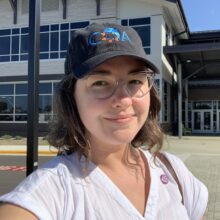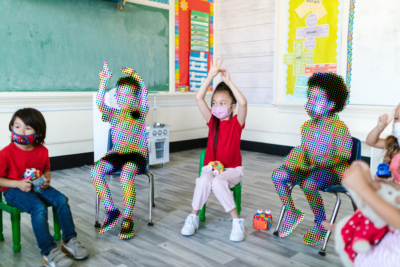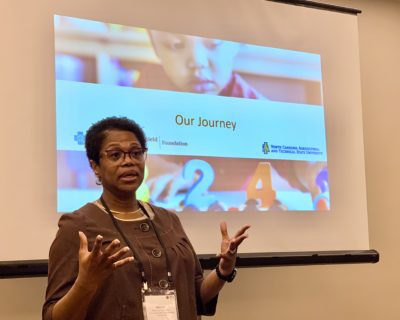

|
|
Black students are disproportionately affected by suspensions and expulsions in early childhood. Now a project that aims to reduce or eliminate the use of such exclusionary discipline among preschool children is under way in two majority-Black counties.
The Hertford-Northampton Smart Start Partnership for Children is working with the Educational Equity Institute (EEI) on a three-year model that leaders from both organizations expect to stem the flow of the preschool-to-prison pipeline.
Ebonyse Mead is president of EEI, but she worked for several years with the North Carolina Partnership for Children. That’s how she came to know Stacey Henderson, executive director of the Hertford-Northampton Smart Start Partnership for Children.
When EEI began developing a model in early 2022 to reduce the use of exclusionary discipline in early care and education settings, Mead asked Henderson if she would be willing to participate.
Henderson describes herself as being “protective” of the people in Hertford and Northampton counties. But she already trusted Mead, and she appreciated that the model would be built around the lived experience of people in her community.
“I’m excited they chose this area because we are excluded from everything,” Henderson said. “I think people kind of just leave us out, so this opportunity is much needed.”
It starts with understanding the problem.
‘Suspensions as a first resort’
As EdNC has reported, the best available data on suspensions and expulsions in early care and education settings comes from the U.S. Department of Education’s Office of Civil Rights (OCR).
OCR’s most recent report on exclusionary discipline is for the 2017-18 school year and only includes information about the 28,385 North Carolina students enrolled in pre-K classrooms operated by a public school system. That’s just 20% of the state’s 4-year-olds, and no children ages birth-to-3.
According to the data, 89 pre-K students received one or more out-of-school suspensions during the 2017-18 school year. There were no reported expulsions. (Expulsions for children under age 14 were legally banned by a state law in 2011.)
Black boys made up almost half (47%) of all recorded suspensions, despite being just 11% of children in the state. Additionally, 40% of suspended pre-K students had legally recognized disabilities.
North Carolina has no system for monitoring suspensions of children under age 4, or of the 80% of 4-year-olds not enrolled in a pre-K class managed by a school district.
“Getting the data for suspensions, that’s not easy,” Mead said. “You know folks are suspending children, but no one wants to tell you that.”
One challenge is that many suspensions aren’t officially recorded as such, partially because of how early care and education settings often handle discipline.
“When you call somebody to come and get their kid for the rest of the day, that is a suspension,” Henderson said. “Whether they took the time to write that paperwork up or not, that is a suspension.”
And as Mead explained, in places where staff and resources are strained, staff members might “use suspensions as a first resort” for handling behavioral issues.
Helping educational stakeholders at every level understand the pervasiveness of exclusionary discipline — especially when relying on anecdotal data instead of real numbers — is a challenge.
“So that’s where we need to break the wall,” Henderson said. “They don’t understand, and that’s where the walls need to be broken.”
‘You have to change mindsets’
The Hertford-Northampton project is in its first year, initially training the Smart Start Partnership staff, then creating and training a “strategic planning team” of community members.
The training EEI provides emphasizes understanding the historical origins of racialized identities in America, and how perceptions of those identities can affect how educational systems engage with Black children.
“We are building the capacity of the staff and the strategic planning team to understand what the issues are at the national and state levels,” Mead said, “and they will help us understand the issues that are within their community.”
While Henderson said she knew about the role race could play in exclusionary discipline practices before she and her team started training with EEI, the training has deepened her understanding of the issue.
“There are some pre-judgments, some pre-expected behaviors that maybe educators look at before the kids even get to school,” Henderson said. “We’re heightening the awareness of it. Now what are we going to do about it? And how can we raise awareness of this before these babies even get to school?”
As Mead put it, “In order to change practices, you have to change mindsets.”
Henderson and her staff have used what they’ve learned to recruit the strategic planning team, members of the community with a connection to early care and education who will be instrumental in designing the second phase of the project, then implementing the third phase.
“Every community is different,” Mead said. “That’s why it’s so important to develop a strategic planning team in the first year.”
The Hertford-Northampton team is made up of moms and dads (one of whom works as a truck driver), child care providers, educators, and even a county commissioner.
Members of the strategic planning team are paid for their time spent in training and the expertise their experiences bring to the project.
When their training is complete, they’ll spend the second year developing a plan for their community to move away from the use of exclusionary discipline in early care and education settings. That work will also be paid. Their plan will then be implemented in the third year, with a focus on sustainability beyond the official completion of the project.
Henderson said the biggest shift she’s observed so far is the recognition that exclusionary discipline is used in early care and education settings, and that it’s a problem.
“People think this is normal, something regular,” Henderson said, “and it’s not regular.”





